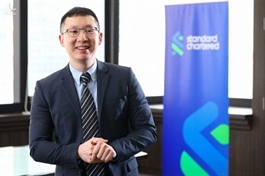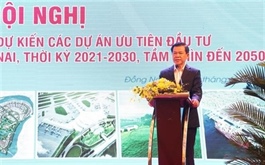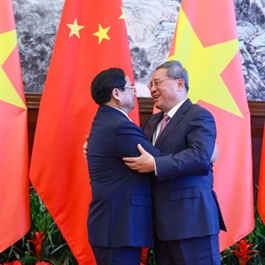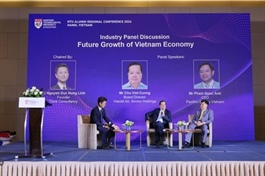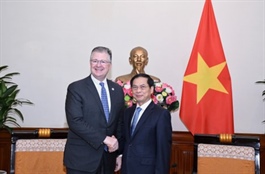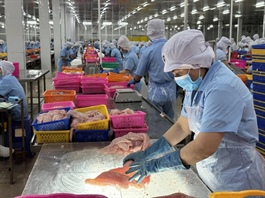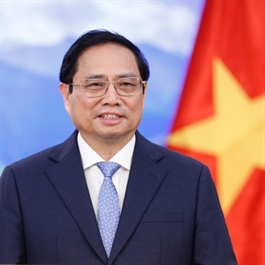PM shares Vietnam’s secrets to successful development over past 40 years
PM shares Vietnam’s secrets to successful development over past 40 years
Vietnam has gone from being a war-torn country to one of the world’s 40 largest economies.
Vietnam's success over the past nearly 40 years has been closely linked to key concepts: innovation, creativity, and integration.
Prime Minister Pham Minh Chinh gave the remarks during his speech at the World Economic Forum's (WEF) 15th annual meeting of the New Champions in Dalian, China today [June 25].
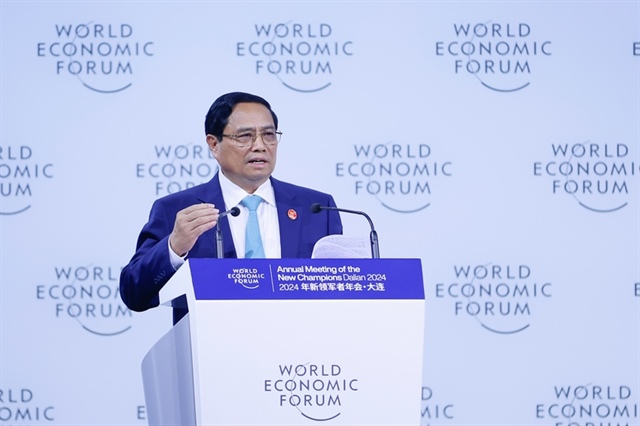
Prime Minister Pham Minh Chinh at the event. Photos: Nhat Bac |
“From a war-torn country devastated by 30 years of conflict and economic embargoes, Vietnam has risen to become a middle-income nation and is now one of the world's 40 largest economies,” said Chinh.
According to the Prime Minister, the international community looks to Vietnam as a model for healing and recovering from the wounds of war, putting the past behind, respecting differences, looking to the future, turning foes into friends, and successfully achieving the United Nations Millennium Development Goals.
Chinh added that the achievements confirm the correctness of the development policies and viewpoints of the Vietnamese Party and State, which are founded on three pillars, six key policies, and three strategic breakthroughs, with the overarching principles being: Maintaining political stability; placing humans at the center as the subject, goal, motivation, and most crucial resource for development; and not trading progress, social equity, social security, and the environment for mere economic growth.
On this occasion, Chinh acknowledged the leading role of China's economy in global growth.
“As close neighbors sharing mountains and rivers, Vietnam is happy to see China's robust development amidst global and regional challenges,” he said.
Chinh added that Vietnam believes that China will continue to drive new growth engines, promote multilateralism, reinforce international solidarity and cooperation, and maintain a peaceful, stable, cooperative, and prosperous regional and global environment.
A resilient, strong, and competitive Chinese economy will have a positive impact on the world, he continued.
On the theme of "New Frontiers of Growth," Chinh urged all parties to build and strengthen trust, emphasize dialogue, promote unity, cooperation, and development, and effectively address issues based on rules while ensuring the harmonious interests of all parties involved.
There should be no politicization or discrimination in science and technology and global innovation, he said.
Chinh called on the WEF and its partners to foster public-private cooperation and play the role of pioneers in leading and guiding the economic restructuring of countries, regions, and the globe, and to strengthen cooperation with developing and poor countries in three key areas: (i) building and perfecting the market economy mechanism: This includes effectively mobilizing and utilizing all resources and improving national governance efficiency; (ii) focusing on the development of strategic infrastructure systems (transportation infrastructure, digital infrastructure, climate change response, social infrastructure, healthcare, and education); and (iii) training and developing human resources, especially high-quality personnel for new growth engines, the digital economy, the green economy, and the circular economy.
Additionally, Vietnam is also committed to strengthening international cooperation in policy-making and implementation at regional and global levels.
Chinh expected stronger cooperation and priority for growth, and closer coordination in proactive, flexible, timely, and effective monetary policy management, especially in reducing interest rates and stabilizing exchange rates.
“This should be combined with a reasonably expansionary fiscal policy, using public investment to drive private investment, and vigorously promoting trade and investment liberalization. These measures aim to stimulate aggregate demand in the short term and have a positive impact on aggregate supply in the medium to long term,” he said.
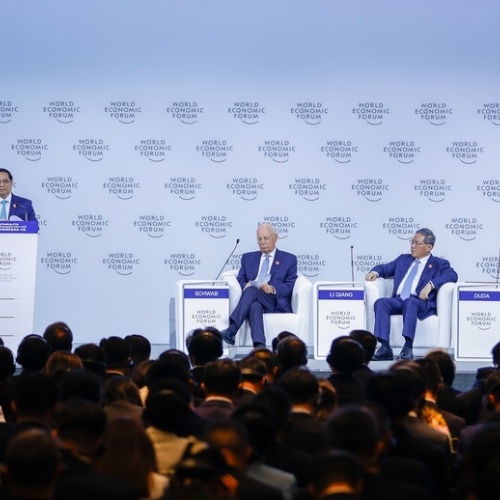
Overview of the event. |
Concluding his speech, the Prime Minister proposed the "3 Together" initiative: Listening and understanding together; sharing visions and actions together; working, benefiting, winning, and developing together, in the spirit of harmonizing interests; and sharing risks for a better, fairer, more equal, harmoniously developed, and sustainable world.
For the third consecutive time, the WEF has invited Prime Minister Chinh to attend its Annual Meeting. This invitation not only underscores the WEF's respect for Vietnam but also highlights Vietnam's significant contributions to global discussions and its inspiring story of innovation, integration, and development.
WEF Founder and Executive Chairman Klaus Schwab in his speech praised Vietnam as a dynamic economy, a beacon of economic development, and a growth leader in the region.
At the event, Chinese Premier Li Qiang emphasized the role of science, technology, and innovation in driving growth and creating new development opportunities. Li proposed four key initiatives: (1) enhancing cooperation and technology sharing for mutual benefit; (2) promoting sustainable development in harmony with nature, in line with the Paris Agreement on climate change; (3) encouraging open markets, greater interaction, and breaking down barriers to reach new horizons; (4) fostering inclusive development and mutual benefit through cooperative training and upskilling of the workforce to meet market demands.
Polish President Andrzej Duda shared Poland's recipe for success in becoming one of the fastest-growing economies in the European Union. He attributed this success to strategic infrastructure investments, leveraging Poland's central location in Europe to connect with Asia, and promoting economic connectivity between the EU and Asia, including China.







